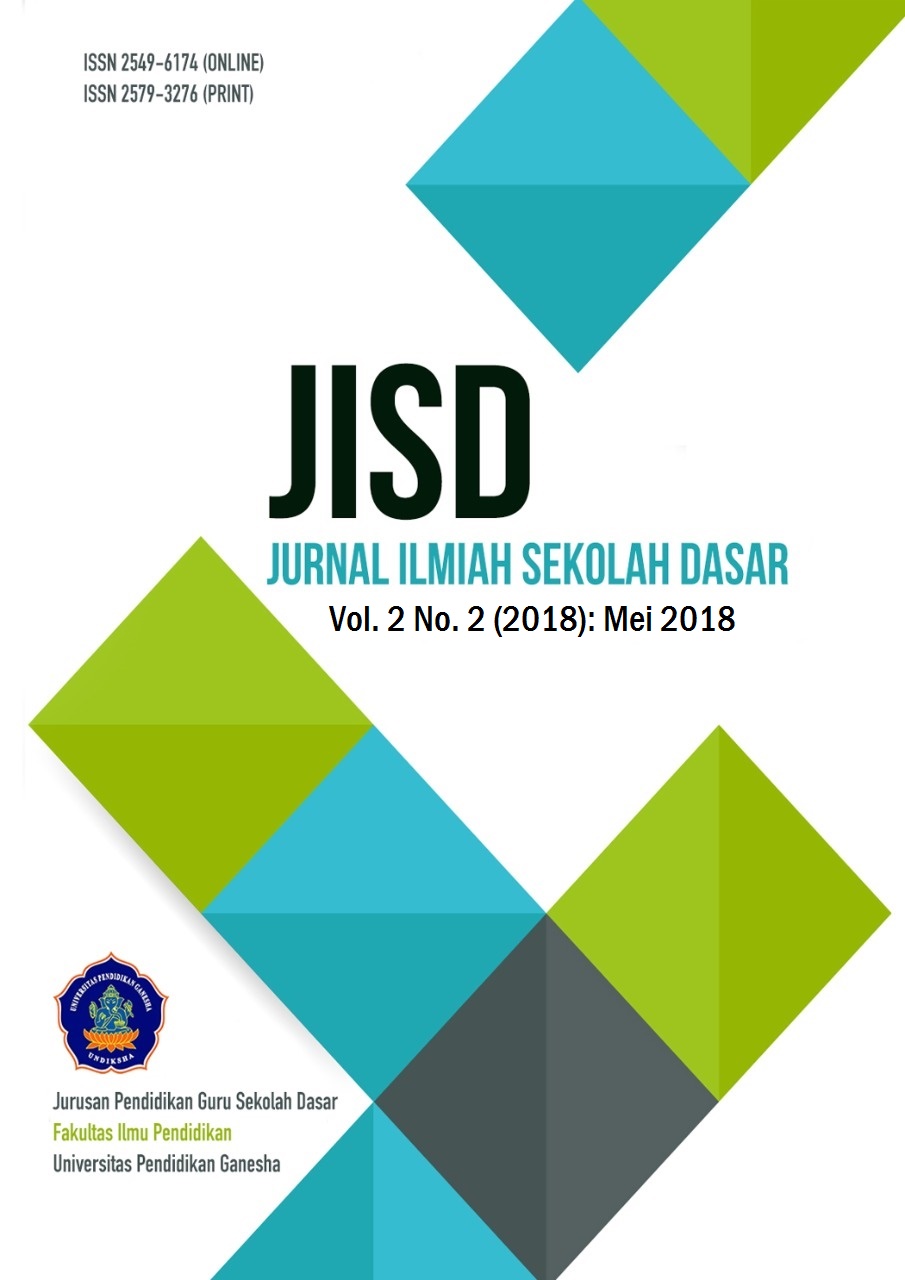PENGARUH PENDIDIKAN SEKSUAL DALAM PEMBELAJARAN TERHADAP PERILAKU KEKERASAN SEKSUAL SISWA KELAS VI
DOI:
https://doi.org/10.23887/jisd.v2i2.13791Abstrak
This study aims to determine whether there is an influence of sex education in learning to the sexual violence behavior of students in 6th grade at SDN Utan Kayu Selatan 23 Pagi, East Jakarta. This research includes quantitative research. The population of this research is 30 students of 6th grade. The sample of this study were taken using a saturated sampling technique. Data collected by questionnaire. The data were analyzed using product moment correlation test and significance test. Through product moment correlation test obtained r value of 0.29. It can be stated that the relationship between sex education and the sexual violence behavior of students has a positive but low relation. The coefficient of determination obtained from the calculation is r2 = 29%. This shows that sex education variable contributes 29% to sexual violence behavior in 6th grade students of SDN Utan Kayu Selatan 23 East Jakarta, while 71% is contribution from other factors such as home environment. From the calculation of significance test coefficient obtained tcount> ttable (1.759 > 1.697), it can be concluded that there is a significant influence between sex education on sexual violence behavior.Referensi
Achmad, A. N. A. (2016). Peran Orang Tua Terhadap Pengetahuan Seks Pada Anak Usia Dini. Jurnal Equilibrium Pendidikan Sosiologi. 4(2), 223-232.
Aprilia, A. (2015). Perilaku Ibu dalam Memberikan Pendidikan Seks Usia Dini pada Anak Pra Sekolah (Studi Deskriptif Eksplorasi di TK IT Bina Insasi Kota Semarang). Jurnal Kesehatan Masyarakat, 3(1), 619-628.
Fatmawati, L., & Maulana, D. (2016). Pengaruh Pendidikan Kekerasan Seksual Terhadap Perilaku Orang Tua Dalam Mencegah Kekerasan Seksual Pada Anak. Journals of Ners Community, 7(2), 188-200.
Hastuti, S. (2014, 8 September). Pendidikan Seksual Anak di TK dan SD: Sebuah Interaksi Pelayanan Bimbingan. Seminar Nasional “Pendidikan Seksual Anak di Masa Sekolah AWAL, hal. 1-11 dari https://repository.usd.ac.id/4004/1/1135_MAKALAH+PENDIDIKAN+SEKSUAL+ANAK+DI+TK+DAN+SD%252C+08092014.pdf.
Hidayaningsih, P. S. H., Tjandrarini, D. H., Mubasyiroh, R., & Supanni. (2011). Faktor-faktor yang Berhubungan Dengan Perilaku Beresiko Remaja di Kota Makassar Tahun 2009. Buletin Penelitian Kesehatan, 39(2), 88-98.
Madani, Y. (2014). Pendidikan Seks Usia Dini Bagi Anak Muslim. Jakarta: Zahra Publishing House.
Maryuni, & Anggraeni, L. (2016). Faktor yang Berhubungan dengan Tingkat Pengetahuan Orangtua tentang Pendidikan Seks Secara Dini pada Anak Sekolah Dasar (SD). Journal Ners and Midwifery Indonesia, 4(3), 135-140.
Notoatmodjo, S. (2012). Promosi Kesehatan dan Perilaku Kesehatan. Jakarta: Rineka Cipta.
Nuari, N. A. (2016). Analisis Perilaku Pencegahan Child Abuse oleh Orang tua Pada Anak Usia Sekolah. Jurnal Ilmu Kesehatan, 5(1), 1-8.
Panjaitan, R. L., Djuanda, D., & Hanifah, N. (2015). Persepsi Guru Mengenai Sex Education di Sekolah Dasar Kelas VI. Mimbar Sekolah Dasar, 2(2), 224-233.
Sugijokanto, S. (2014). Cegah Kekerasan Pada Anak. Jakarta: PT. Elex Media Komputindo.
Sulistianingsih, A., & Widayati, W. (2016). Hubungan Pengetahuan Dengan Perilaku Ibu Memberikan Pendidikan Seks Pada Anak. Jurnal Ilmiah Kebidanan, 7(2), 34-43.
Wathoni, K. (2016). Persepsi Guru Madrasah Ibtidaiyah Tentang Pendidikan Seks Bagi Anak (Studi Kasus di MI Se-Kecamatan Mlarak). Kodifikasia, 10(1), 203-227.
Unduhan
Diterbitkan
Cara Mengutip
Terbitan
Bagian
Lisensi
Authors who publish with the Journal Ilmiah Sekolah Dasar agree to the following terms:
- Authors retain copyright and grant the journal the right of first publication with the work simultaneously licensed under a Creative Commons Attribution License (CC BY-SA 4.0) that allows others to share the work with an acknowledgment of the work's authorship and initial publication in this journal.
- Authors are able to enter into separate, additional contractual arrangements for the non-exclusive distribution of the journal's published version of the work (e.g., post it to an institutional repository or publish it in a book), with an acknowledgment of its initial publication in this journal.
- Authors are permitted and encouraged to post their work online (e.g., in institutional repositories or on their website) prior to and during the submission process, as it can lead to productive exchanges, as well as earlier and greater citation of published work. (See The Effect of Open Access)











